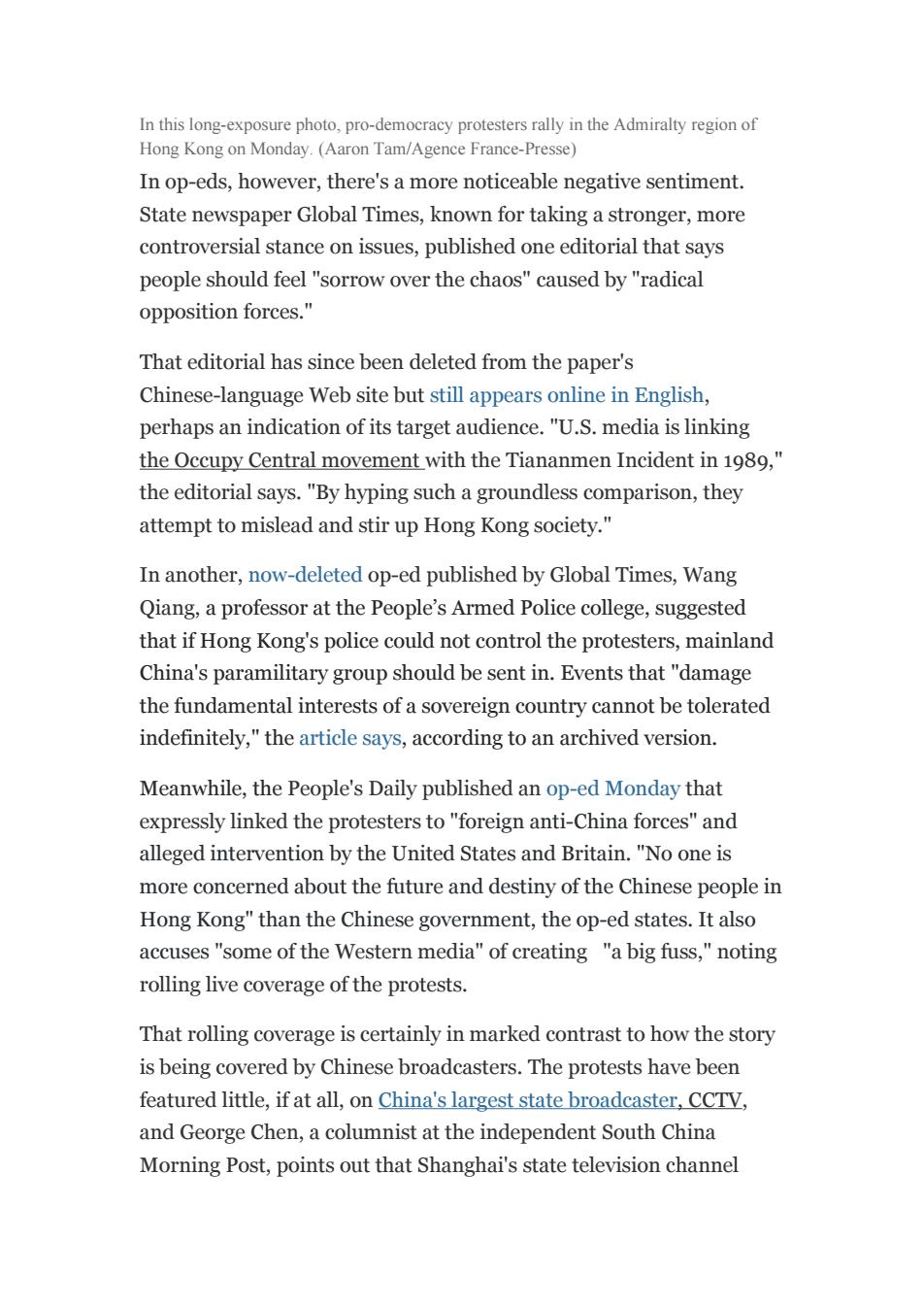正在加载图片...

In this long-exposure photo,pro-democracy protesters rally in the Admiralty region of Hong Kong on Monday.(Aaron Tam/Agence France-Presse) In op-eds,however,there's a more noticeable negative sentiment. State newspaper Global Times,known for taking a stronger,more controversial stance on issues,published one editorial that says people should feel"sorrow over the chaos"caused by"radical opposition forces." That editorial has since been deleted from the paper's Chinese-language Web site but still appears online in English, perhaps an indication of its target audience."U.S.media is linking the Occupy Central movement with the Tiananmen Incident in 1989," the editorial says."By hyping such a groundless comparison,they attempt to mislead and stir up Hong Kong society." In another,now-deleted op-ed published by Global Times,Wang Qiang,a professor at the People's Armed Police college,suggested that if Hong Kong's police could not control the protesters,mainland China's paramilitary group should be sent in.Events that "damage the fundamental interests of a sovereign country cannot be tolerated indefinitely,"the article says,according to an archived version. Meanwhile,the People's Daily published an op-ed Monday that expressly linked the protesters to "foreign anti-China forces"and alleged intervention by the United States and Britain."No one is more concerned about the future and destiny of the Chinese people in Hong Kong"than the Chinese government,the op-ed states.It also accuses "some of the Western media"of creating "a big fuss,"noting rolling live coverage of the protests. That rolling coverage is certainly in marked contrast to how the story is being covered by Chinese broadcasters.The protests have been featured little,if at all,on China's largest state broadcaster,CCTV, and George Chen,a columnist at the independent South China Morning Post,points out that Shanghai's state television channelIn this long-exposure photo, pro-democracy protesters rally in the Admiralty region of Hong Kong on Monday. (Aaron Tam/Agence France-Presse) In op-eds, however, there's a more noticeable negative sentiment. State newspaper Global Times, known for taking a stronger, more controversial stance on issues, published one editorial that says people should feel "sorrow over the chaos" caused by "radical opposition forces." That editorial has since been deleted from the paper's Chinese-language Web site but still appears online in English, perhaps an indication of its target audience. "U.S. media is linking the Occupy Central movement with the Tiananmen Incident in 1989," the editorial says. "By hyping such a groundless comparison, they attempt to mislead and stir up Hong Kong society." In another, now-deleted op-ed published by Global Times, Wang Qiang, a professor at the People’s Armed Police college, suggested that if Hong Kong's police could not control the protesters, mainland China's paramilitary group should be sent in. Events that "damage the fundamental interests of a sovereign country cannot be tolerated indefinitely," the article says, according to an archived version. Meanwhile, the People's Daily published an op-ed Monday that expressly linked the protesters to "foreign anti-China forces" and alleged intervention by the United States and Britain. "No one is more concerned about the future and destiny of the Chinese people in Hong Kong" than the Chinese government, the op-ed states. It also accuses "some of the Western media" of creating "a big fuss," noting rolling live coverage of the protests. That rolling coverage is certainly in marked contrast to how the story is being covered by Chinese broadcasters. The protests have been featured little, if at all, on China's largest state broadcaster, CCTV, and George Chen, a columnist at the independent South China Morning Post, points out that Shanghai's state television channel